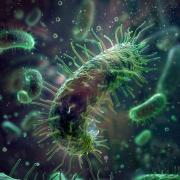E.coli Outbreak: Nationwide Alert Issued Over Contaminated Food Item
Unraveling the UK's E.coli Outbreak Mystery: A Nationwide Health Alert
Have you been experiencing stomach cramps, diarrhea, or fever recently? You might be one of the unfortunate victims of a mysterious E.coli outbreak sweeping across the United Kingdom. In a recent statement, the UK Health Security Agency (UKHSA) has issued an urgent health warning in response to a nationwide surge in E.coli cases linked to a yet-to-be-identified "nationally distributed food item."
The concerning outbreak has already led to the hospitalization of around 37 people in England alone, with a total of 113 reported cases across the UK. While the majority of the infections affect young adults, the patient's ages range from as young as 2 years old to 79.
In the quest to uncover the culprit behind the outbreak, the UKHSA has found a common thread: the presence of Shiga toxin-producing E. coli O145 (Stec). While this strain is notorious for causing severe diarrhea, stomach cramps, and fever, it can also lead to a life-threatening condition known as hemolytic uraemic syndrome (HUS), which may cause kidney failure, particularly in children.
With the wide geographic spread of cases and their possible link to a widely distributed food item, it's crucial that we take necessary precautions to safeguard ourselves and our loved ones. Although the UKHSA has ruled out the spread of the disease through water sources, they emphasize the importance of adhering to stringent hygiene practices.
Darren Whitby, Head of Incidents and Resilience at the Food Standards Agency (FSA), echoes this sentiment. He urges the public to exercise vigilance when handling and preparing food, including washing hands regularly with soap and warm water and ensuring equipment, utensils, and surfaces are thoroughly cleaned to prevent cross-contamination.
So, what can you do to protect yourself and your family from this unsettling outbreak? Here are some essential tips from the UKHSA:
1. Regularly wash your hands with warm water and soap. Please don't rely solely on alcohol gels, as they may not effectively kill all the harmful bacteria.
2. Practice good food hygiene by washing fruits and vegetables properly and ensuring food is cooked thoroughly.
3. Avoid preparing food for others and visiting people in hospitals or care homes if you experience diarrhea and vomiting.
4. Refrain from returning to work, school, or nursery until 48 hours after your symptoms have subsided.
As the investigation into the elusive E.coli source continues, remember to stay vigilant and adhere to these essential guidelines. Together, we can protect our communities and help combat this mysterious outbreak.
By D7muzic












